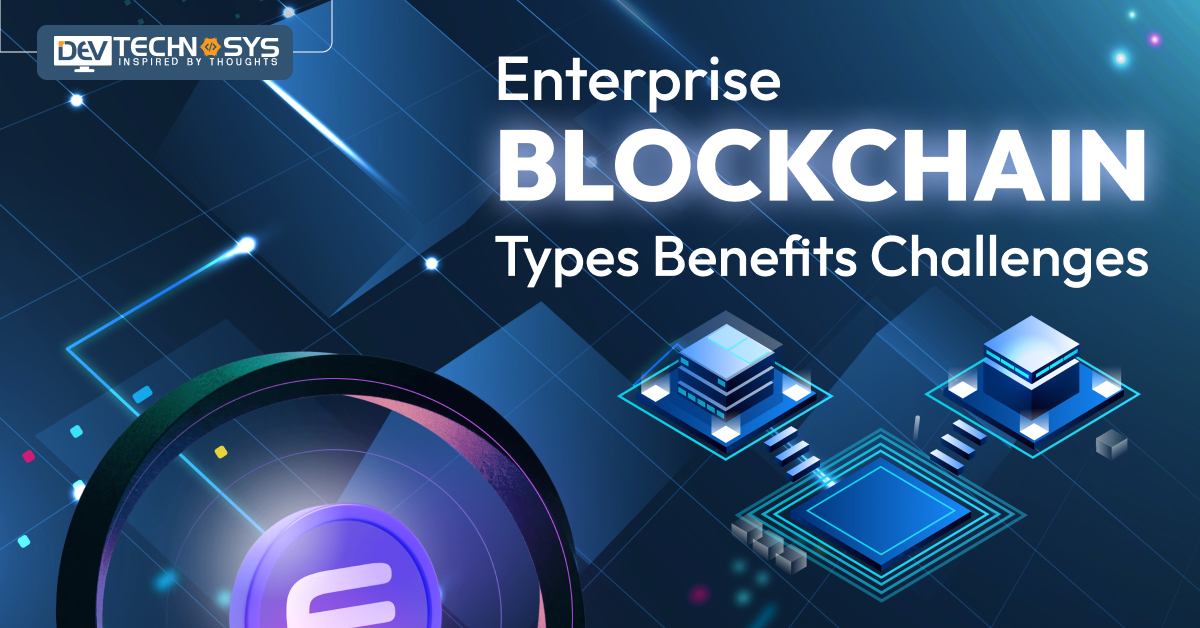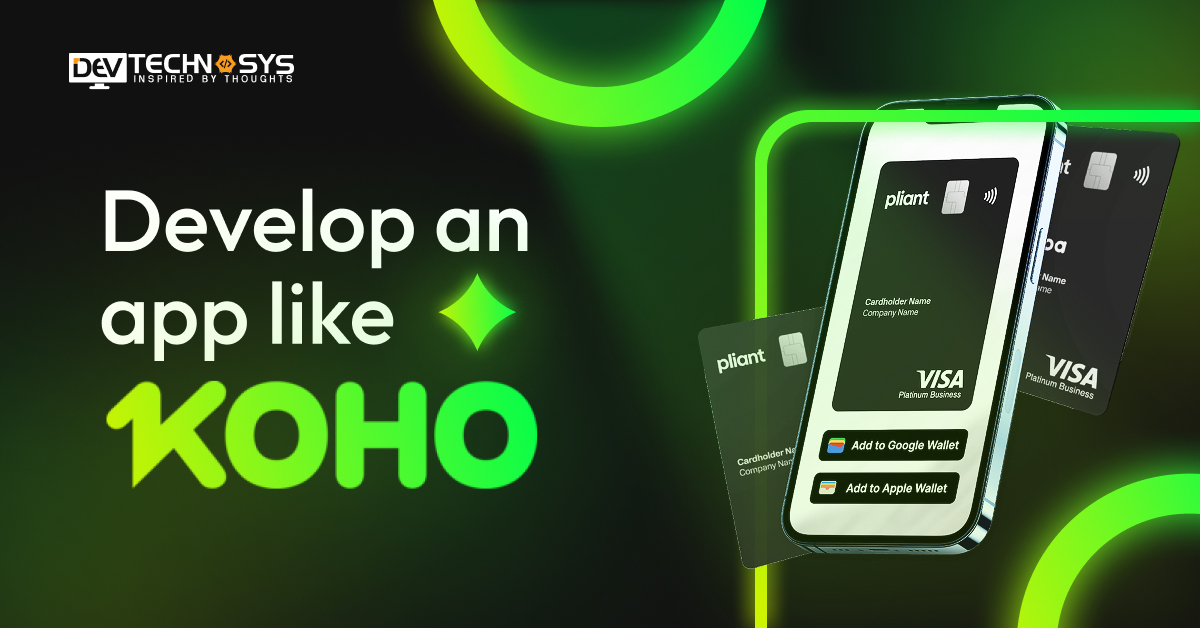Blockchain technology is growing rapidly, bringing numerous advantages to enterprises. The advantages of blockchain development for enterprises range from streamlined supply chain operations to enhanced cybersecurity options.
According to blockchain development experts for enterprises, organizations are incorporating the blockchain trend into their core operating processes rather than just taking it as an interesting and unique concept.
However, we know blockchain for enterprises also brings some major challenges. The striking impact of blockchain, while evident, is impeded by overcoming the challenges such as interoperability, regulatory compliance, and scalability.
In today’s blog, we will discuss the enterprise blockchain, its benefits for enterprises, and its growing popularity, and highlight its key aspects, including types, benefits, challenges, and more. So tune in for an exciting journey.
What Sets Enterprise Blockchains Apart From Other Blockchain Types?
The smart contract capability of enterprise blockchains is the key factor that differentiates it from others. Enterprise blockchains are designed to support robust, flexible smart agreements, letting businesses automate processes and create custom systems. Blockchain development companies use this functionality to develop scalable and efficient solutions.
In contrast, blockchains like Bitcoin lack this flexibility, limiting their use to simple transactions involving digital assets. For businesses, the ability to custom make the app with advanced smart contracts is what makes blockchain for the enterprise a top choice.
Market Stats of Global Blockchain Technology
- The Global Enterprise Blockchain Market is set to rise at a CAGR of 5%, with predictions of increment in expected value USD 9.6 Bn in 2023 to approximately USD 287.8 Bn by 2032.
- The market is expected to rise at a CAGR (2023 – 2030) of 7% by the end of year 2030.
- The global blockchain technology market was expected to be around USD 33.5 billion by the end of the year 2025, with predictions that it will reach USD 3155.4 billion by the financial year 2034, with a CAGR of around 57.54% between 2025 and 2034.
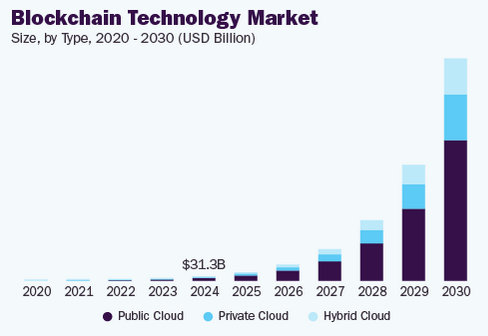
- The hybrid blockchain segment is the largest, accounting for 42% of the total market.
- The banking and financial services industry is the largest end-use industry, accounting for 20% of the total market.
- The Asia-Pacific (APAC) region is the fastest-growing market in the blockchain industry, driven by several key factors, with a compound annual growth rate (CAGR) of 5% forecasted for the period 2024-2030.
Evolution of Blockchain in Enterprises
Blockchain technology was introduced to us in the 1970s. The evolution of blockchain can be placed into three generations that are mentioned below:
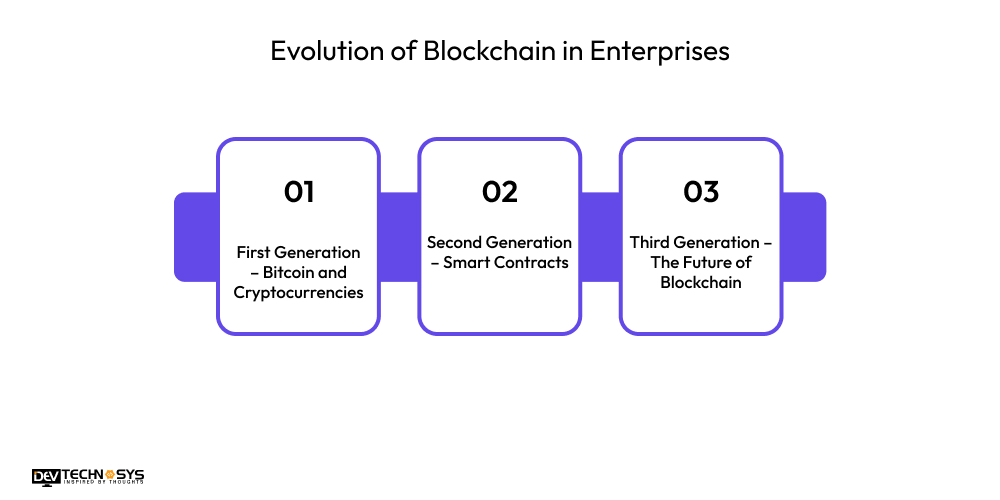
1. First Generation – Bitcoin and Cryptocurrencies
In 2008, an anonymous entity identified as Satoshi Nakamoto presented blockchain technology in its modern form with the help of Bitcoin white paper. This system used 1 MB blocks for exchange of bitcoins, setting up foundational features that remain vital to blockchain even today.
2. Second Generation – Smart Contracts
Following the emergence of cryptocurrencies, developers providing enterprise mobility solutions began finding blockchain applications beyond digital currency. Creators of the Ethereum blockchain for enterprises introduced smart agreements, enabling automated exchanges and asset transactions on the blockchain.
3. Third Generation – The Future of Blockchain
As organizations keep making and discovering applications for blockchain, the technology of blockchain is evolving to tend to challenges like scalability. There is a vast potential for innovation as industries continue to adopt the constant blockchain revolution.
How do Enterprise Businesses Leverage Blockchain Technology?
Blockchain technology transforms the enterprise tasks by issuing a decentralized ledger for secure and safe transaction recording. It employs Distributed Ledger Technology (DLT) to ensure integrity in data and prevent single points of failure which is important for business reliability.
According to an enterprise blockchain development company, smart contracts automate processes and agreements, reducing manual errors and enhancing efficiency by executing predefined rules without intermediaries.
Blockchains for enterprises utilize consensus tools and techniques likeProof of Authority (PoA) or Practical Byzantine Fault Tolerance (PBFT), which makes speed top priority, security, and efficient resources.
According to a top provider of enterprise mobility solutions & services in the USA, this combination of technologies enables businesses to streamline operations, maintain transparency, and scale effectively.
Types of enterprise blockchain solutions
Now that we’ve covered the basics of what enterprise blockchain technology is, let’s explore some of the most common types of B2B blockchain for enterprise platforms:
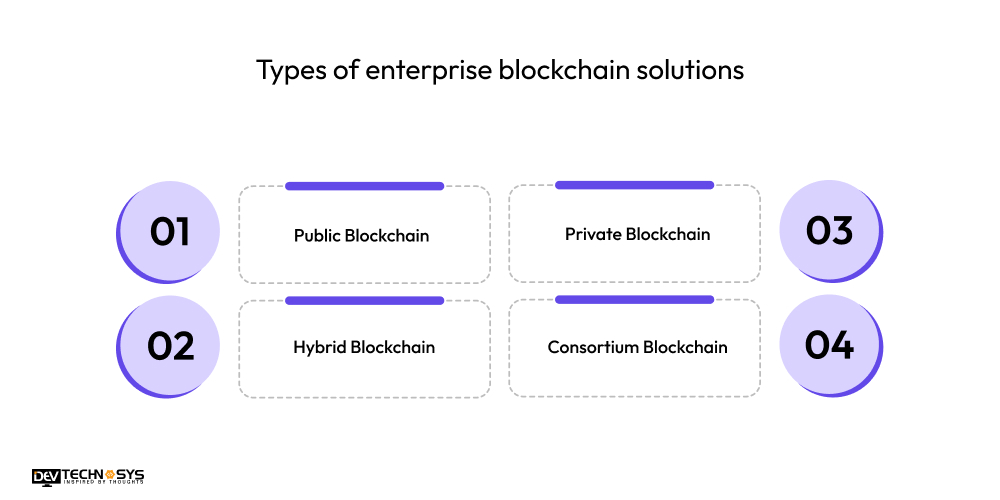
Feature |
Public Blockchain |
Private Blockchain |
Hybrid Blockchain |
Consortium Blockchain |
Access |
Open to anyone | Restricted to authorized participants | Mix of public and private access | Limited to a group of organizations |
Control |
Decentralized | Centralized (one entity controls) | Controlled by one or more parties | Semi-decentralized (group governed) |
Transparency |
Fully transparent | Limited transparency | Selectively transparent | Shared within consortium |
Speed & Scalability |
Generally slower | Fast and scalable | Balanced performance | Faster than public; scalable within members |
Security |
Very secure but vulnerable to 51% attacks | Controlled security with limited nodes | High security with configurable permissions | Secure, with distributed trust |
Cost of Transactions |
Higher due to mining | Lower as resources are managed internally | Moderate costs | Cost-effective among participants |
Consensus Mechanism |
PoW / PoS / DPoS | PBFT / RAFT / Custom | Flexible (can use PoW + permissioned mechanisms) | Custom (voting, RAFT, etc.) |
Best Use Cases |
Cryptocurrency, public voting, crowdfunding | Internal record keeping, identity verification | Finance, real estate, healthcare | Banking, trade finance, supply chain collaboration |
1. Public Blockchain
A public blockchain for enterprises is open for anyone to join and participate, make sure full decentralization and transparency. Multiple people taking part and validating transactions with the consensus measures like Proof of Work or Proof of Stake. This type of blockchain is ideal for situations where unreliable transactions are crucial. Examples include Bitcoin and Ethereum.
2. Private Blockchain
Private blockchains are among the best blockchain for enterprises that are restricted to authorized users or organizations and are governed by a central entity. Only selected few can access, validate, and alter data, offering better authority and security. This model is generally used for internal purposes in companies, such as secure record-keeping or supply chain management.
When it comes to blockchain app development cost, a private enterprise blockchain is more cost-friendly then hybrid or consortium blockchain.
3. Hybrid Blockchain
Hybrid blockchain for enterprises merges the both public and private blockchain elements, enabling the access to data while maintaining transparency which is greatly needed. This flexible structure is best for cases that need confidentiality and getting approval from the public, such as government projects or regulated industries.
4. Consortium Blockchain
A consortium blockchain for enterprises is managed by a group of companies, offering a platform that is shared with more governance than a public blockchain that is completely decentralized. It balances privacy and clarity, making it ideal for partnership between industries where trust between a few parties is needed. Examples may contain cross-bank networks or sharing of healthcare data.
Key Benefits of Enterprise Blockchains
Enterprise blockchain solutions offer many benefits that not only enhance business tasks and functions but do a lot more than that. Let’s delve into three key benefits:
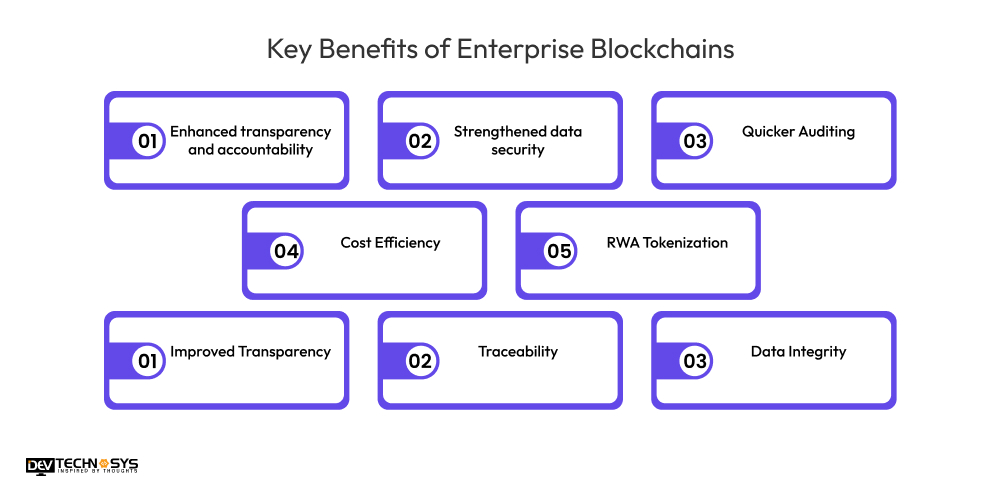
1. Enhanced transparency and accountability
Enterprise blockchains are made specially to be sure against any tempering or fraud, making them highly secure for storing sensitive information. The structure of blockchain enterprise structure that lessens the cyber-fraud risks and data breach, ensuring the safety and security of critical business information. This enhanced security strengthens trust among partners and customers.
2. Strengthened data security
Blockchain enterprise solutions are made specifically to be tamper-evident, making them secure options for storing sensitive information. The decentralized structure ensures the minimization of the risk of data breaches and other cyber fraud ensuring that business-critical data remains protected.
3. Quicker Auditing
According to the blockchain development company, the chronological and immutable record-keeping provided by blockchain allows for faster and more secure auditing. The transaction clarity of data eases the process of generating, exchanging, and archiving e-transactions, making audits much better and more efficient.
4. Cost Efficiency
Executing international transactions using traditional measures that requires the intermediaries and significant transaction charges. Enterprise blockchain removes this requirement by executing transactions directly and securely.
5. RWA Tokenization
Another prominent benefit of enterprise blockchain involves real-world asset tokenization. It includes tokenizing arts, stocks, real estate, and other valuable assets ready for purchase by customers around the globe. With this, enterprises get great chances and business models to increase flexibility and liquidity.
6. Improved Transparency
Enterprise blockchain benefits needed enhancement of transparency within the company and among stakeholders. The technology offers a record of transparency and immutability where only authorized parties can view and verify transactions, ensuring a positive and transparent environment and maintaining accountability.
7. Traceability
Blockchain development experts for enterprise use this technology to keep track of transactions and other operations. For example, blockchain technology can help with supply chain and professionals in the logistics industry to keep track of their goods, improving the clarity.
8. Data Integrity
Blockchain for enterprises is authorised and permissioned; it is immutable and verifiable. It means the data presented on it is the testament of clarity and transparency, which is highly important for enterprises like finance, healthcare, banking and more.
Frameworks of Enterprise Blockchain Platforms
Now that we’ve covered the basics of what enterprise blockchain technology is let’s explore some of the most common types of B2B blockchain platforms:
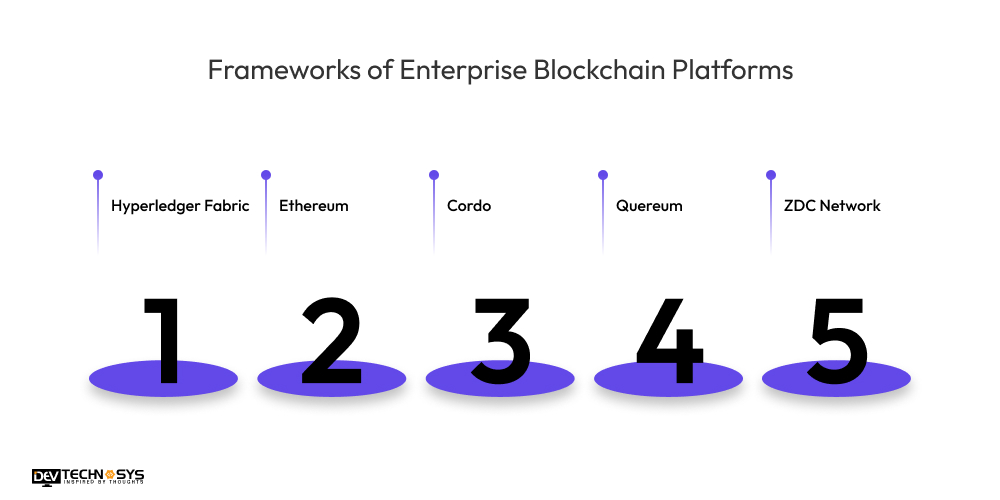
1. Hyperledger Fabric
Hyperledger Fabric is a blockchain framework type that is created for businesses. This operates as a network with permission, meaning that the users need to have registrations and permission to take part. This procedure of registration involves delivering users with transaction control and identity access.
2. Ethereum
The platform works as a leading aspect in the development of many decentralized apps available in the market, particularly in the enterprise setup. According to companies providing stellar blockchain development services, the blockchain community trusts Ethereum because it offers numerous benefits, including strong security, stable performance, no downtime, and effective fraud prevention.
3. Cordo
Corda is a platform made for open-source blockchain that ensures businesses to directly transact while ensuring strict security and privacy with smart contract integrations. Corda platform is used by companies to reduce record-keeping and transaction costs and make it easy for diverse businesses to manage processes.
The agile software or platform scales up or down to meet requirements for real-time business . Applications built on Corda lets you make a specialized token that can handle transactions of enterprise-scale finance.
4. Quereum
This network is permissioned and supports both private and public forms of transactions. It is considered ideal for developing applications that demand fast speed and quick processing of a blockchain ecosystem’s private transactions.
Quorum blockchain for enterprise applications is perceived as an evolving stage. It has become an integral part of blockchain journey in various industries, which are not restricted to offering decentralized finance products.
5. ZDC Network
The XDC Network is an enterprise-grade hybrid blockchain designed for finance and global trade. It combines transparency of public blockchains with the privacy and speed of private networks with the help of cross-chain smart contracts. This makes it ideal for corporations needing fast, secure, efficient, and compliant transactions across traditional and decentralized finance.
Top Enterprise Blockchain Features
According to a top enterprise product development company, here are some of the top enterprise blockchain features:
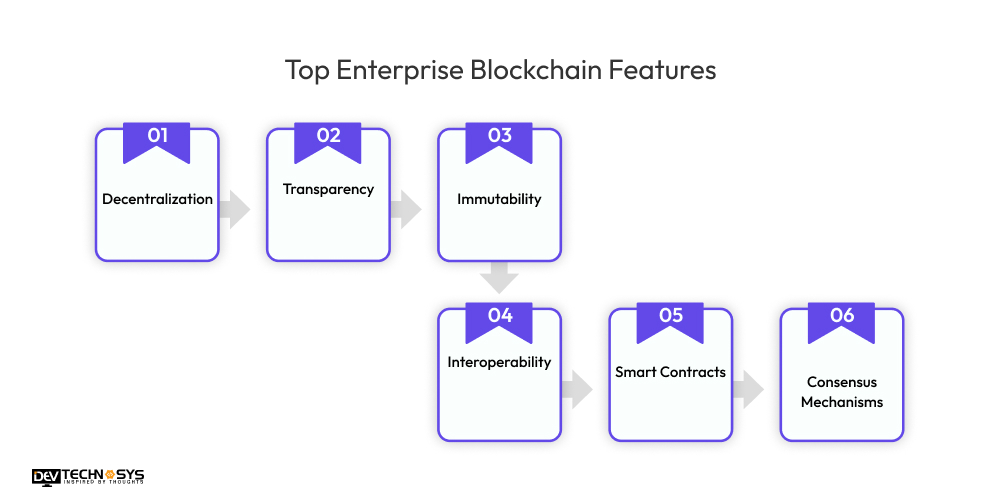
1. Decentralization
In a blockchain for enterprises, authority is distributed among several authorized participants, rather than a single entity. This ensures that no single point of control exists, enhancing the system’s resilience and eliminating reliance on a sole central authority for trust and operations.
2. Transparency
All approved members of the blockchain network have access to the same, consistent, and tamper-proof record of all transactions. This shared, real-time visibility fosters a “single source of truth,” significantly improving auditing capabilities and reducing disputes among business partners.
3. Immutability
Once a transaction or data entry is recorded and added to the blockchain, it becomes permanently fixed and cannot be altered or deleted. This fundamental characteristic provides an unchallengeable audit trail, which is absolutely critical for regulatory compliance, data integrity, and establishing undeniable proof of origin.
4. Interoperability
Developers providing solana blockchain development services include this feature that enables an enterprise blockchain to seamlessly connect and exchange data with other distinct blockchain networks or integrate smoothly with traditional IT systems like ERP and CRM software. It’s crucial for businesses to avoid data silos and ensure their blockchain solutions fit into their broader digital ecosystem.
5. Smart Contracts
These are self-executing agreements with the terms of the contract directly programmed into code. They automatically trigger actions and transactions when predefined conditions are met, drastically streamlining complex business processes, reducing manual intervention, and minimizing the risk of errors or disputes.
6. Consensus Mechanisms
These are the sophisticated protocols that allow all distributed nodes in the blockchain network to collectively agree on the validity of transactions and the accurate state of the shared ledger. For enterprises, these mechanisms are typically faster and more energy-efficient than public blockchain versions, ensuring efficient and secure transaction processing.
Challenges in Using Enterprise Blockchain
Implementing enterprise blockchain presents several challenges that the best enterprise mobile app development companies must navigate to achieve successful adoption. Key challenges include:
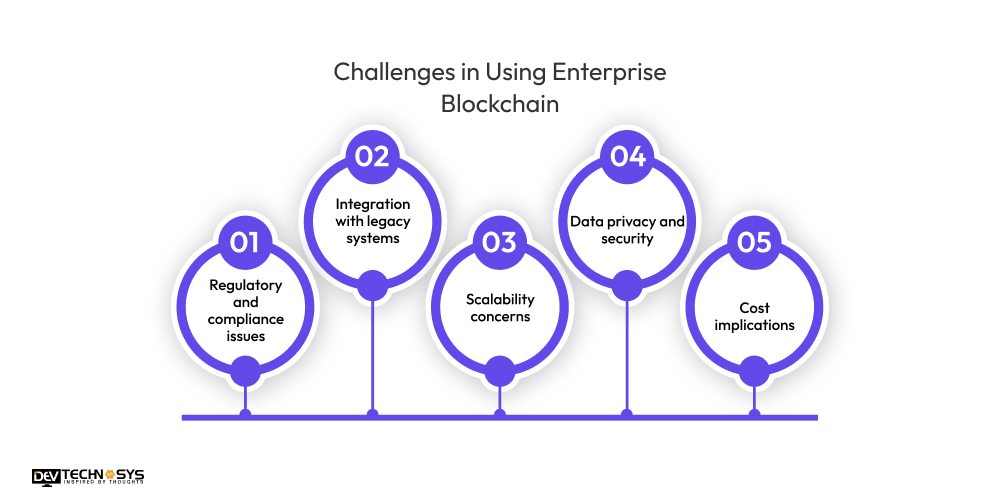
1. Regulatory and compliance issues
Blockchain development for enterprises can face many challenges, including regulatory and compliance issues. Blockchain disrupts old concepts of owning data and jurisdiction, frequently subjected to legal and regulatory challenges.
Organizations must find out complex legal landscapes, ensure adherence to legal laws, and adhere to regulations specifically created for that particular region, making implementation more challenging.
2. Integration with legacy systems
A top enterprise blockchain development company can rely on legacy systems and databases that must be included with blockchain solutions. To deal with this challenge in blockchain development for enterprises, developers need to conduct careful strategizing and planning, API development, and standardization of data formats to achieve seamless interoperability between blockchain networks and existing technologies, which can be time-consuming and technically demanding.
3. Scalability concerns
As blockchain networks grow, scalability issues come along, including transaction processing slower and increasing the consumption of resources. Developers use programs like Flutter for enterprise app development, and implementing enterprise blockchain solutions like sharding, layer-2 protocols, and parallel processing can help address these challenges.
4. Data privacy and security
Organizations offering services for enterprise blockchain development should keep data privacy and security issues on top priority. It is highly crucial to balance transparency and confidentiality, especially in industries keeping hold of important and sensitive data. Using advanced encryption techniques, zero-knowledge proofs, and the power to disclose this info to selective people can protect confidential information.
5. Cost implications
Implementing an enterprise blockchain has substantial upfront costs, including development for infrastructures and ongoing maintenance. Issuing a clear ROI report and convincing the stakeholders of the immense benefits blockchain can bring is usually a critical challenge for businesses. To overcome this challenge, hire a blockchain app developer from a reputable company.
Conclusion
The mentioned details and information discusses the enterprise blockchain. We hope it clears any doubts you might have. Through this blog, we try to inform you regarding the various operations and tasks of the enterprise blockchain system, introduce you to its types and features, and also print the challenges you may encounter while creating an app through blockchain enterprise.
If you are a business wanting to enter this lucrative enterprise blockchain industry, and want enterprise blockchain app development services, then contact our experts at Dev Technosys, one of the leading blockchain app development companies you may know today.
Frequently Asked Questions
Q1. What Is Enterprise Blockchain And How Is It Different From Public Blockchain?
Enterprise blockchain is a permissioned system designed for organizational use, offering controlled access and enhanced privacy, unlike public blockchains which are open and decentralized.
Q2. What Are The Main Types Of Enterprise Blockchain?
The main types include Private Blockchain, Consortium Blockchain, Public Blockchain (in limited enterprise use), and Hybrid Blockchain, each serving different levels of control and transparency.
Q3. Why Should Businesses Consider Using Blockchain Technology?
Businesses benefit from increased transparency, improved traceability, data security, automation via smart contracts, and reduced operational costs.
Q4. What Are The Key Advantages Of Using Private Or Consortium Blockchains In Enterprises?
They offer enhanced control, faster transaction speeds, custom governance, privacy for sensitive data, and are scalable for internal use cases.
Q5. What Industries Can Benefit The Most From Enterprise Blockchain Solutions?
Industries like supply chain, finance, healthcare, logistics, energy, and real estate are seeing transformative benefits from enterprise blockchain adoption.
